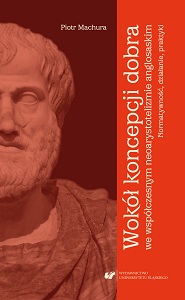Wokół koncepcji dobra we współczesnym neoarystotelizmie anglosaskim: normatywność, działanie, praktyki
Framing the Concept of the Good in Contemporary Neo-Aristotelianism: Normativity, Actions, Practices
Author(s): Piotr Machura
Subject(s): Philosophy, History of Philosophy, Philosophical Traditions, Special Branches of Philosophy
Published by: Wydawnictwo Uniwersytetu Śląskiego
Keywords: Neo-Aristotelianism
Summary/Abstract: The aim of the book is to frame the concept of the good as the essence of the good life. Against the “happiness industry” it is argued that it might be best grasped within the frame work of Neo-Aristoelianism in the form developed in post-analytical tradition since the 1950s. I argue that Anscombe’s intervention led not only to the development of virtue ethics, but (on the basis of the evolution of analytical tradition to its post-analytical form on the one side, and its progressing naturalisation and growing interest in philosophy of mind and cognitive science on the other) but also, and primarily, to restoration of Aristotelianism as conceptual scheme (in the sense of Davidson) which enables both fruitful analysis of the main technical problems of contemporary moral philosophy and adequate answering to the key issues of moral and social life. Starting with analysis of the very Aristotelian turn and arguing for its understanding in terms of critical theory I develop an analysis of Aristotelianism not in the sense of historical and language scholarship, but rather in search of intellectual resources. This enables to discuss key issues in normativity and highlighting the possibility of overcoming the fact/value gap. Followingly, the concept of the good life is discussed with the attention being paid to the development of the individual agency and sense of life, as well as to the forms of self-discipline needed for such a development. This development, I argue, is a development of an embedded self, which might become conscious and coherent agent thanks to phronetic ordering of the goods and activities as way of distributing its most basic resources: time and attention. This also makes the grasp of the ethical possible not as purely abstract set of rules, but as part of daily routine of an the agent. Last chapter discusses the possibility of recognition of the good of other beings as well as social standards of the good life. I outline the capability approach as intervention in the local distortions of possibilities of human development and by pinpointing its weaknesses I claim of the MacIntyrean concept of the practice being not only most adequate to frame the moral development of the agent, but also to validation of the forms of social interaction. Reading MacIntyre’s Aristotelianism through Bourdieu’s concept of habitus I argue that it is by in-depth recognition of the intentional structures of its activities that the agent may obtain self-knowledge giving them a sense of happiness.
Series: Filozofia
- E-ISBN-13: 978-83-226-3653-4
- Print-ISBN-13: 978-83-226-3652-7
- Page Count: 424
- Publication Year: 2019
- Language: Polish
- eBook-PDF
- Table of Content
- Introduction

